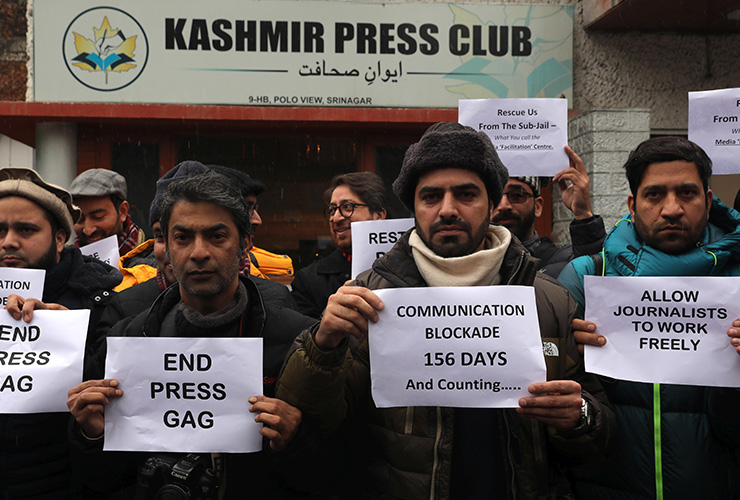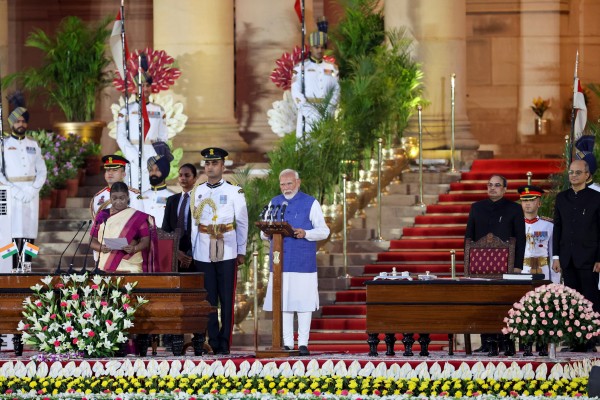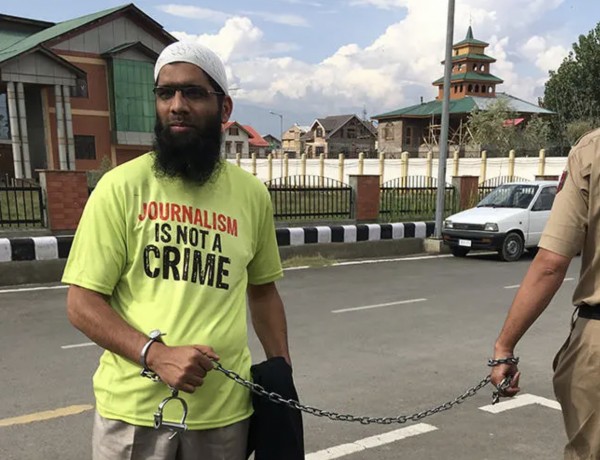Just one day after The Hindu last August published a report on what was described as “revolving door arrests in Kashmir”, Peerzada Ashiq, the newspaper’s correspondent in the region, heard a knock on his own door. It was a police summons. When Ashiq arrived at the station, he was questioned for about an hour about his sources. “The summoning was aimed at intimidating me from any further reportage on the subject of detentions from Jammu and Kashmir”, Ashiq told the International Press Institute (IPI) in a recent interview.
But Ashiq’s experience is far from the only attempt to intimidate journalists in Indian-administered Kashmir since the Indian government ended the territory’s autonomy last year.
On December 17, journalists Azaan Javaid and Anees Zargar were covering a protest in Srinagar, the summer capital of Jammu and Kashmir, when they were beaten up by the police, in full public glare. “Why did you carry stories against me?” one of the police officers asked the journalists, referring to some of their earlier articles.
Naseer Ganai and Haroon Nabi were summoned on February 8 to the police counter-insurgency centre (Cargo). The journalists were questioned about a statement of the Jammu Kashmir Liberation Front (JKLF), an organization banned in Kashmir, which they had reported on in their dispatches. “I was asked to reveal the email ID from which I had got the statement”, Ganai was quoted as saying in a statement issued by the Kashmir Press Club.
In total, around 10 incidents of this kind have been reported and documented by the Kashmir Press Club since August 5 last year until the beginning of March this year. Journalists, many of whom requested anonymity, told IPI that it has become a common practice for the police to ask them to reveal their sources.
After the Indian government last August revoked Article 370 of the Indian constitution, which had accorded the Indian-administrated Kashmir a special status, the conditions for journalists to work in Jammu and Kashmir have worsened on many fronts. In addition to harassment by the security forces, journalists in Kashmir are facing difficulties in reporting because of a continued blockade on high-speed internet access by the government and a ban on the use of social media, which has now at least temporarily been lifted.
“It is not easy to work as a journalist in Kashmir these days. The restrictions, the summoning by the police and the inability to access the high-speed internet have hamstrung all reporters. It has impacted the reportage”, Ashiq said.
Tightened state control
State surveillance and pressure on journalists have increased since August, Azaan Javaid, a special correspondent working for ThePrint, told to IPI. Some journalists have been stopped from travelling abroad. A recent report by local human rights groups noted that for several weeks journalists were prevented from travelling to districts of the Jammu and Kashmir territory to report on development-related issues. Other journalists have also been evicted from residences that had been provided by the government in the past in keeping with practice in some states of India.
Khurram Parvez, a human rights activist working for Jammu Kashmir Coalition of Civil Society, described the situation on the ground in Jammu and Kashmir as very problematic. He said that local media are reporting far less on daily incidents, including human right violations by Indian security forces. Instead, only international and Indian media outside of Kashmir have been able to cover these events. “That tells us there is arm-twisting going on, there is censorship, there is gagging”, Parvez told IPI.
According to a report by the Network of Women in Media, India and the Free Speech Collective, there is now an absence of critical editorial voices in major Kashmiri newspapers. A Kashmir-based journalist who requested anonymity told IPI that this lack of critical coverage is partly due to the media’s dependency on the government for advertisements. The lack of proper communication lines and restricted internet has also led to unemployment of journalists.
International support is needed to improve the conditions for local journalists in Kashmir, Parvez said. He said that the international community should be as strict towards India as it has been towards China in condemning the violations done by the state.
Shutdown of online communication
The internet ban that began in August in Jammu and Kashmir lasted for six months, which has been called the longest blackout ever recorded in a democracy. According to annual review of the human rights in Jammu and Kashmir produced by local civil society groups, the ban was the 55th internet blockade recorded in the territory in the year 2019.
In January, the Indian government partially restored internet access for some institutions providing “essential services”, like hospitals, government offices and hotels, after a ruling by India’s Supreme Court. Later the same month the government allowed 2G mobile internet access to some 300 government-approved websites.
“Basically, a major tool of journalism has been taken away or is restricted”, long-time Srinagar-based journalist Parvaiz Bukhari told IPI.
This has seriously hampered the work of journalists in Jammu and Kashmir. Working without internet or only with restricted internet has severely hindered journalists from reporting about developments in remote parts of Kashmir. It has been difficult to get real-time information, report in real-time on the ground and contact the sources, journalists say. Journalists have been forced to rely on press briefs issued once or twice a week by the state government, without possibilities to verify the stories.
“The concerned officers do not even talk to journalists for any official confirmation and once journalists file the story, the officials argue that journalists are giving only one side of the story”, the anonymous journalist said.
Internet usage under government surveillance
During most of the shutdown, the internet could only be used in a government-run Media Facilitation Centre, which was set up in August in a hotel in Srinagar.
“In the initial days, journalists would write their stories and then save them on pen-drives and later through someone they would send pen-drives to Delhi and from there the courier would hand it over to the concerned office”, the anonymous journalist told IPI.
In the Media Facilitation Centre only a few computers were available for some 200 journalists, meaning they have to wait for hours to briefly use a computer. Many journalists avoid using the centre as they suspect that their emails would be monitored. According to news reports, some journalists have also been stopped for trying to enter the facility.
The centre has now been shifted from the hotel to the premises of the Department of Information and Public Relations. The same journalist said that reporters are forced to use government-installed systems and login with their personal data, dispensing with any notions of privacy journalists need to do their jobs.
“Once you enter the centre, there is security and you necessarily have to pass through a metal detector gate. Where else do journalists work like that?”, the anonymous journalist asked.
Now that access to internet has slightly improved with 2G, according to Kashmiri journalists, some journalists have been given a facility of a leased-line service in their offices after signing an agreement not to “misuse” the internet service. However, the majority of journalists, mostly freelancers and photojournalists, still have to go to Media Facilitation Centre to send their stories.
“The fact that the administration decided to restore high-speed internet to hotels, travels companies and government offices first but not the local newspapers run from Kashmir, only reflected a deliberate strategy to deny local journalists (their ability to work) in a free environment”, Ashiq said.
Cases against social media users
On March 4, the government lifted the curbs on social media until March 17, but has still not allowed high-speed internet on mobile devices. In any case, only phones with sim cards registered with the government can access the internet. The government has not explained the limit.
According to journalists, the ban on social media sites such as Facebook, WhatsApp and Twitter was a strategic move by the government to prevent users from accessing information about Kashmir that had not been provided by the government. A second Kashmir-based journalist who requested anonymity said that government did not want people to use social media because news can’t be controlled there.
“Social media allows free flow of information. I think they are worried about that and don’t want that free flow out of Kashmir”, a journalist said.
From August until the beginning of March, when the curbs on social media were lifted, people in Kashmir, including journalists, have been circumventing the social media ban by using virtual private networks (VPN). However, the VPNs do not always work properly.
Earlier this year the government filed a case against hundreds of unnamed internet users who had used VPN to circumvent the social media ban. According to reports, the authorities are probing hundreds of suspected users who are allegedly “misusing social media to propagate unlawful activities and secessionist ideology”. Police have also said they are targeting people under anti-terror laws, a growing tool for repressing free expression across the globe.
According to the journalists interviewed by IPI, those caught with a VPN on their mobile, including journalists, risk being beaten up and having the phone smashed.
For journalists, social media is an essential tool as they rely on it to find sources, tips and story ideas and, also share their own work. “Cutting off journalists from social media is like taking a fish out of water. It chokes journalists and limits their ability to report”, Peerzada Ashiq said.
Even though the government has lifted curbs on social media – at least temporarily – the situation otherwise for journalists in Kashmir continues to be deeply troubling. Azaan Javaid, who was beaten by the police, says it looks like the state is only tightening its information stranglehold on Kashmir.
“In that case it comes to journalist’s initiative to keep on reporting what they can. It might become difficult, but I think we have to maintain that independence and objectivity in our reporting. It only becomes imperative for us to do that”, Javaid said.



